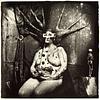Take a photo of a barcode or cover
challenging
informative
reflective
medium-paced
challenging
informative
reflective
medium-paced
informative
reflective
slow-paced
challenging
informative
reflective
slow-paced
“On the most fundamental level there are transitions from continuous to discontinuous or from discontinuous to continuous. We are discontinuous beings, individuals who perish in isolation in the midst of an incomprehensible adventure, but we learn for our lost continuity. We find the state of affairs that binds us to our random and ephemeral individuality hard to bear. Along with our tormenting desire that this evanescent thing should last, there stands our obsession with a primal continuity linking us with everything that is.”
i'm not even sure where to begin discussion of Georges Bataille's Erotism: Death and Sensuality; it feels impossible to represent it fully in anything other than itself in its entirety. this book, first published in french as L'Erotisme in 1957, is, among other things, part anthropological discourse on taboos and transgression, part sprawling exposition on the nature of eroticism (it comes in three flavors: physical, emotional, and religious), part literary analysis of—in particular—the Marquis de Sade's works, and part philosophical treatise on the significance of death, continuity, murder, sacrifice, and organized religion. i do think that the introduction was the most lucid section of the entire book for me, though that may be because i've read and re-read it the most times! Bataille is conceptually difficult and the complexity of his ideas finds a mirror in his prose (a difficulty which, to be fair, is likely exaggerated by the fact that i read him in translation). but Erotism: Death and Sensuality was a fascinating read, especially because of its reflections on continuity, the relation of work to taboos and transgression, and the connection Bataille articulates between eroticism and mysticism, all of which i will briefly (and likely incoherently) discuss in turn below.
regarding continuity, i was particularly fascinated by the distinction Bataille draws between erotic activity and reproductive activity: the former points towards continuity, while the latter "implies the existence of discontinuous beings." eroticism points to continuity not only because entering into the state of erotic desire entails a dissolution of the discontinuous self or selves involved, a dissolution which is necessary to permit erotic merger. yet eroticism—and perhaps this is most clear in religious eroticism, or in the nature of the sacred—also points to continuity in the fact that, in the eyes of the lover, the beloved makes the world transparent and (you've guessed it!) continuous.
i was also compelled by Bataille's anthropological account of the origin of taboos, which he identifies as originating from humankind's alignment of itself with work, which "reduce[s] everything to order." taboos, then, emerge "in response to the necessity of banishing violence from the course of everyday life." yet, interestingly, the emergent taboos are not absolute. rather, he documents permitted, even organized and prescribed, violations of taboos. in fact, he goes as far as saying that "the taboo is there to be violated," since humans [and, of course, here—as well as earlier, with his account of humankind, i am expanding his language from 'men' and 'mankind'] are simultaneously driven by two instincts: away from the forbidden object or action by fear, and towards the subject of the prohibition by fascination. as a result, the very fact that the object is the subject of a taboo, the very fact that it is forbidden (and therefore, he suggests, sacred), "is what arouses the desire." transgressions of taboos, then, do not disregard or destroy the taboos in question; instead, they preserve the taboo, because that is what makes transgressing a known taboo, doing something known to be forbidden, delicious.
the last aspect of Bataille's theory (though, to be fair, i am unsure whether it can properly be called that) which i will discuss in this review is his account of the relationship between mysticism or sanctity and eroticism. he of course clarifies that such experiences are neither the same nor of the same nature, but merely that he intends to elucidate some ways in which they are related. specifically, he identifies a point of relation in the fact that "both experiences have an extreme intensity." this extreme intensity can be seen in mysticism in something like the overwhelming experience of recognizing a divine presence or sacred reality within oneself or the world, and in eroticism in “the desire to go keeling helplessly over that assaults the innermost depths of every human being,” which is simultaneously feared and desired (recalling and recreating the fear/fascination, appall/attract, taboo/transgression dichotomy). yet both of these modes of experience, in which “a wish to lose one’s footing but without falling irrevocably” is characteristic, enable “a spontaneous surge of life that is usually kept under control but which bursts forth in freedom and infinite bliss.” see, once again, the transgression of the taboo, which has the potential to burst forth in limitless violence (“once a limited licence has been allowed, unlimited urges towards violence may break forth.”) here, then, we conclude where Erotism: Death and Sensuality began, in the introduction: eroticism is assenting to life up to the point of death.
(and yes, i did originally pick this up because of Leila Taylor's extraordinary article "The Amorous Annihilation of Will: An Examination of Georges Bataille's Death & Sensuality Through Bryan Fuller's Hannibal.)
i'm not even sure where to begin discussion of Georges Bataille's Erotism: Death and Sensuality; it feels impossible to represent it fully in anything other than itself in its entirety. this book, first published in french as L'Erotisme in 1957, is, among other things, part anthropological discourse on taboos and transgression, part sprawling exposition on the nature of eroticism (it comes in three flavors: physical, emotional, and religious), part literary analysis of—in particular—the Marquis de Sade's works, and part philosophical treatise on the significance of death, continuity, murder, sacrifice, and organized religion. i do think that the introduction was the most lucid section of the entire book for me, though that may be because i've read and re-read it the most times! Bataille is conceptually difficult and the complexity of his ideas finds a mirror in his prose (a difficulty which, to be fair, is likely exaggerated by the fact that i read him in translation). but Erotism: Death and Sensuality was a fascinating read, especially because of its reflections on continuity, the relation of work to taboos and transgression, and the connection Bataille articulates between eroticism and mysticism, all of which i will briefly (and likely incoherently) discuss in turn below.
regarding continuity, i was particularly fascinated by the distinction Bataille draws between erotic activity and reproductive activity: the former points towards continuity, while the latter "implies the existence of discontinuous beings." eroticism points to continuity not only because entering into the state of erotic desire entails a dissolution of the discontinuous self or selves involved, a dissolution which is necessary to permit erotic merger. yet eroticism—and perhaps this is most clear in religious eroticism, or in the nature of the sacred—also points to continuity in the fact that, in the eyes of the lover, the beloved makes the world transparent and (you've guessed it!) continuous.
i was also compelled by Bataille's anthropological account of the origin of taboos, which he identifies as originating from humankind's alignment of itself with work, which "reduce[s] everything to order." taboos, then, emerge "in response to the necessity of banishing violence from the course of everyday life." yet, interestingly, the emergent taboos are not absolute. rather, he documents permitted, even organized and prescribed, violations of taboos. in fact, he goes as far as saying that "the taboo is there to be violated," since humans [and, of course, here—as well as earlier, with his account of humankind, i am expanding his language from 'men' and 'mankind'] are simultaneously driven by two instincts: away from the forbidden object or action by fear, and towards the subject of the prohibition by fascination. as a result, the very fact that the object is the subject of a taboo, the very fact that it is forbidden (and therefore, he suggests, sacred), "is what arouses the desire." transgressions of taboos, then, do not disregard or destroy the taboos in question; instead, they preserve the taboo, because that is what makes transgressing a known taboo, doing something known to be forbidden, delicious.
the last aspect of Bataille's theory (though, to be fair, i am unsure whether it can properly be called that) which i will discuss in this review is his account of the relationship between mysticism or sanctity and eroticism. he of course clarifies that such experiences are neither the same nor of the same nature, but merely that he intends to elucidate some ways in which they are related. specifically, he identifies a point of relation in the fact that "both experiences have an extreme intensity." this extreme intensity can be seen in mysticism in something like the overwhelming experience of recognizing a divine presence or sacred reality within oneself or the world, and in eroticism in “the desire to go keeling helplessly over that assaults the innermost depths of every human being,” which is simultaneously feared and desired (recalling and recreating the fear/fascination, appall/attract, taboo/transgression dichotomy). yet both of these modes of experience, in which “a wish to lose one’s footing but without falling irrevocably” is characteristic, enable “a spontaneous surge of life that is usually kept under control but which bursts forth in freedom and infinite bliss.” see, once again, the transgression of the taboo, which has the potential to burst forth in limitless violence (“once a limited licence has been allowed, unlimited urges towards violence may break forth.”) here, then, we conclude where Erotism: Death and Sensuality began, in the introduction: eroticism is assenting to life up to the point of death.
(and yes, i did originally pick this up because of Leila Taylor's extraordinary article "The Amorous Annihilation of Will: An Examination of Georges Bataille's Death & Sensuality Through Bryan Fuller's Hannibal.)
“The supreme moment is indeed a silent one, and in the silence our consciousness fails us.”
Will most definitely be reading more of this guy.
Will most definitely be reading more of this guy.
pretty dark
transgression, and death
the sacred realm of violence
transgression, and death
the sacred realm of violence
informative
mysterious
reflective
slow-paced
challenging
emotional
informative
inspiring
medium-paced
dark
informative
reflective
slow-paced
Not at all what I thought it would be, very slow paced and boring, it practically rubbes in your face that a white cis, straight, european man wrote it.








